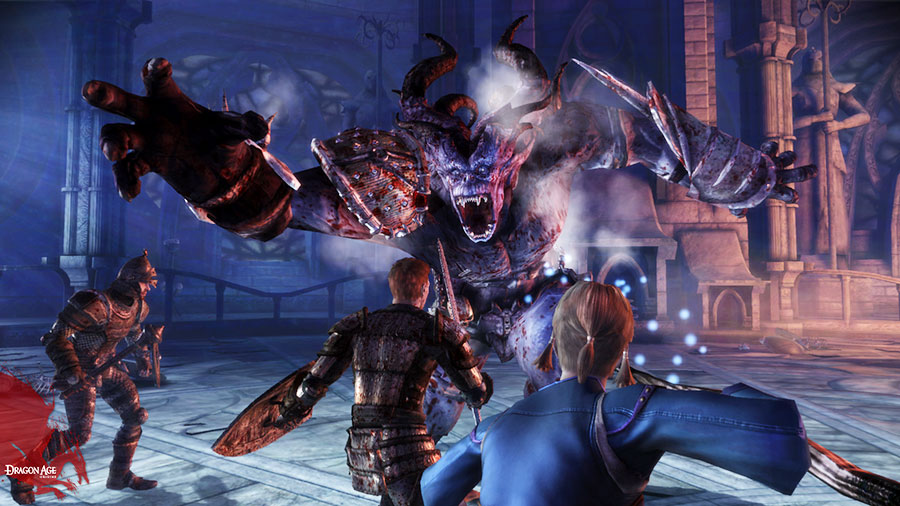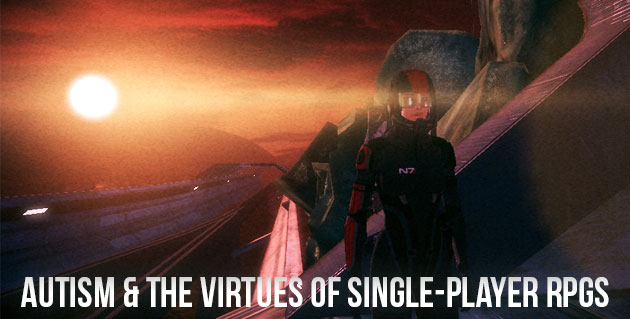- 19Shares
Guest blogger: Amalena is a freelance writer and editor, and just received her BFA in Creative Writing. She loves fantasy novels, singing opera, and video games. You can check out more of her work on her blog, Some Girl with a Braid, and follow her on Twitter.
As an autistic individual, there’s a special place in my heart for single-player role-playing games. I started with Skyrim, fell in love, and have since added other games such as Mass Effect, Dragon Age, Portal, Diablo, and Assassin’s Creed to my computer.
As an autistic, one of the best things for me when it comes to games is the predictability. While exploring the world can provide plenty of unpredictability as far as spawning adversaries, especially for the first time, doing replays removes much anxiety-inducing uncertainty and allows pure enjoyment. I also know that completing the storylines will result in positive social interactions from the NPCs populating the virtual environment. In real life, social disability colors all my interactions. I don’t know if completing my questline will result in a positive experience; I’m liable to put my foot in my mouth at any moment, sometimes without realizing it. Video games are generally devoid of those situations.
This brings me to another aspect of single-player RPGs that fits perfectly with an autistic coping mechanism: scripting. Scripting is when I write out or practice potential conversations and run through/memorize lines I might say in advance. In real life, this gets only limited success because I can’t script other people. In a single-player RPG, there is literally a script that I get to play through for both myself and all other characters. There’s something secure and comfortable in that mental sensation. I know that I can pick the right choices to get the words and impressions I want to express; if I want to, I can go online and find guides to dialogue choices to make other characters like me. I can do this for games like Dragon Age, where social relationships are important, or load previous saves to get things just right. I can even have a sensual, beautiful, romantic relationship with strength and confidence in a game like Mass Effect. I love Garrus, and I can be sure that he loves me too. As a bonus, I can save the galaxy. I can take the confidence of Commander Shepard and bring it into real-life interactions. Whether I’m successful or not is for fate to decide, but knowing that I’m capable of it, at least virtually, helps.

There’s also something special in games such as Skyrim, Dragon Age: Origins, and many other older games: no player-character spoken dialogue. Portal has something similar, except that there is no dialogue of any kind for the player-character. I like that I’m still treated by the game as competent and intelligent despite playing a character incapable of speech, with a disconnect between her mind and body. This disconnect is most evident in Portal 2 when learning controls – I’m asked to speak by an NPC, and instead told by the game to use the button to make myself jump. Yet I’m still a bright, capable character – proven by the puzzles I solve.
But I’d like to focus on the concept of non-verbal dialogue. While I’m not non-verbal, my mind ‘speaks’ differently than I do aloud. I have the words in my head and on the written page worthy of being an English major, but in real life, I recently forgot the word for “plate”. I feel that games like Skyrim and Dragon Age: Origins capture the sensation of talking with my mind. I do have dialogue choices. I interact with NPCs and they understand my words without having to hear them at all, and they respond in the way that suits them best as characters. It feels like the NPCs know what I want to say without having to hear it, saving me the trouble of sorting out how to talk. It feels ideally autistic. It feels like me.
I think that if autistic people could have one super power or magical ability to make life easier, we would be telepathic. We would project our emotions, images, and words exactly how we see, hear, and feel them into the minds of others so that communication would no longer be so difficult. Having a player-character that doesn’t speak is almost like having a bit of that while playing. That’s why I’ll always love older games like Dragon Age: Origins, despite its graphics and world not being as detailed and expansive as it’s modern sequel, Dragon Age: Inquisition. I even leave subtitles on for newer games to capture a bit of that feeling.
Long live the silent players. Long live the autistics.
If you’ve enjoyed this post and want to support the disabled writers here, please consider donating to The Geeky Gimp on Patreon. All guest bloggers are paid, and all funds raised go toward this blog.


1 thought on “Autism and the Virtues of Single-Player RPGs”